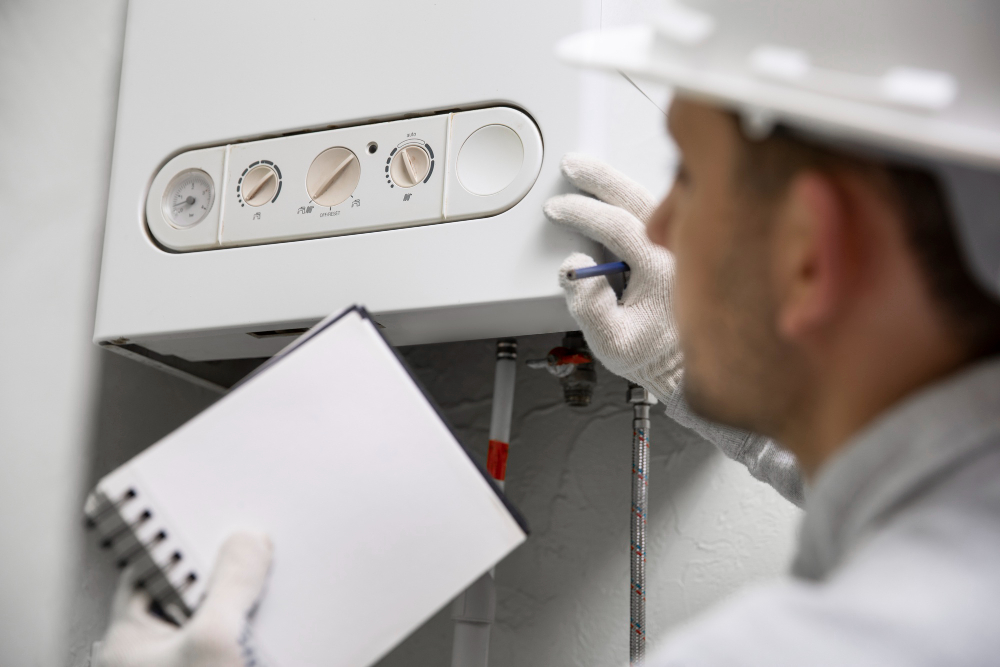Water heaters are the unsung heroes of modern household comfort, silently toiling away to ensure that your showers are warm, your dishes are clean, and a multitude of daily tasks are executed with the right temperature. Despite their crucial role, they often go unnoticed until something goes wrong.
In this comprehensive guide, we explore the world of water heaters in detail, helping homeowners understand the various types available, the intricate parts that keep them running, and crucial insights into their functioning.
If you’ve ever pondered the differences between a tankless system and a traditional storage tank water heater, or you’ve been daunted by the prospect of replacing your home’s heating system, this post is for you. We’ve got you covered from the moment hot water is demanded to the agile response of these essential home appliances.
Types of Water Heaters
There are primarily three types of water heaters that you can consider for your home. Each comes with its set of advantages and disadvantages, depending on your specific requirements.
Tankless Water HeatersHow They Work
Tankless water heaters, also known as on-demand water heaters, heat water directly without the use of a storage tank. A flow sensor activates the heating mechanism when you turn on the hot water tap, and the water passes through a series of high-powered burners or electric coils, heating it to the required temperature almost instantly.
Pros and Cons
Pros
- Energy efficiency – no standby heat loss since there’s no tank to constantly heat the water
- Unlimited hot water – as long as there’s proper sizing and adequate water and gas or electric supply
- Space-saving – tankless systems are smaller and can be mounted on walls
Cons
- Higher upfront costs – tankless water heaters can cost more to purchase and install
- Output limits – limited by the flow rate of the water heater, so simultaneous use can be a problem
- Retrofitting complexity – installing a tankless system in a home designed for traditional water heaters might need significant alterations to gas lines or venting.
Conventional Storage Tank Water HeatersHow They Work
These are the most common type of water heaters, using a large tank to store and heat water. Cold water enters the bottom of the tank and is heated by either a gas burner or electric heating elements. A thermostat monitors the temperature and activates the heating elements as needed.
Pros and Cons
Pros
- Lower initial cost
- Simplicity – easy to install and maintain
- Immediate availability – as hot water is stored, it’s available as soon as a faucet is turned on
Cons
- Standby heat loss – the energy is used to keep the water hot, even when the water heater isn’t in use
- Limited hot water supply – the size of the tank determines the amount of hot water available at one time
- Shorter lifespan – they typically last 10-15 years, whereas tankless heaters can last over 20 years.
Heat Pump Water HeatersHow They Work
These innovative water heaters move heat rather than generating it directly. They pull warmth from the air and use it to heat the water in the tank. They work like a refrigerator but in reverse—where a fridge extracts heat from its interior to keep things cool, a heat pump water heater uses the ambient air to keep the water inside its tank warm.
Pros and Cons
Pros
- Energy efficiency – heat pump water heaters consume less energy, saving you money on your utility bills.
- Environmentally friendly – they produce fewer greenhouse gas emissions compared to electric or gas tanks.
- Lower humidity – they can also dehumidify the space where they are installed.
Cons
- Higher installation cost – heat pump water heaters come with a higher price tag.
- Cooling effects – in warm climates, the cooling function can become a downplayed bonus, as it cools down the surrounding air while heating the water.
- Location dependency – the availability of warm ambient air is critical for the effective operation of a heat pump water heater.
Parts of a Water Heater
Water heaters consist of several essential parts that work together to provide you with consistent hot water supply.
Common Components across all TypesHeating Elements/Tank
The heart of the water heater is the heating mechanism, whether it’s gas burners, electric coils, or a heat pump. It applies the necessary heat to raise the cold water’s temperature to the pre-set level.
Pressure Relief Valve
This crucial safety feature will release water or steam if the pressure inside the tank gets too high, preventing the tank from exploding.
Thermostat
The thermostat controls the water temperature inside the tank and also turns the heating elements on and off as required to maintain the set temperature.
Unique Parts in Different Types
Each water heater type comes with specific components that cater to its unique method of heating water. For instance, a tankless system might have high-efficiency heat exchangers, while a heat pump water heater integrates a fan, evaporator, compressor, and refrigerant to function effectively.
How Water Heaters Work
Understanding how a water heater functions is key to maintaining an efficient system.
Basic Mechanics of Heating Water
- Tank storage: The tank fills with cold water that is then heated and stored until needed.
- Tankless systems: Water passes through the heating apparatus without being stored, ensuring a continuous supply.
- Heat pumps: These systems capture warmth from the air and transfer it to the water to raise its temperature.
Energy Efficiency Considerations
When choosing a water heater, it’s crucial to consider the long-term energy costs. Tankless systems are lauded for their efficiency, but the initial cost can be significantly higher. Heat pump water heaters are also highly efficient but might not be practical in all climates.
Maintenance Tips to Keep Them Working Efficiently
Regular maintenance is essential for the optimal operation of your water heater.
- Flush the tank: Sediment can build up and affect the unit’s efficiency over time, so a periodic tank flush is recommended.
- Check the anode rod: This rod attracts corrosive elements in the water and can become a key maintenance point over time.
- Inspect for leaks and rust: Keeping an eye on the integrity of the tank can prevent costly water damage.
Choosing the Right Water Heater for Your Home
Selecting the right water heater involves several considerations to ensure it meets your household’s needs and aligns with your values.
Factors to ConsiderHousehold Size and Demand
The number of people in your home and their hot water usage habits will dictate the size and type of water heater you need. Larger families or homes with high water demands may benefit more from a high-capacity storage tank system.
Energy Efficiency
Your geographical location and energy costs play a significant role. Determine which type of system will provide the best balance of performance and cost-savings in the long run.
Space Availability
Not all homes can easily accommodate a water heater. Tankless and heat pump systems are especially advantageous for smaller homes with space restrictions.
Comparing the Types Based on the Above Factors
A thorough comparison of the different types of water heaters considering your specific household variables should narrow down your ideal choice. Tankless systems might be perfect for energy-conscious individuals living in smaller household units, while traditional storage tank systems are a reliable choice for those seeking affordability and straightforward functionality.
Water heaters are indispensable appliances that offer comfort and convenience to modern life. Understanding the types available, the parts that make them tick, and how to choose the right one for your home is empowering and can save you time, money, and headaches down the line.
Remember, when it comes to water heaters, informed decision-making is the keystone of a comfortable home. Make sure to assess your household’s hot water demands, consider the long-term energy costs, and contemplate installation and maintenance implications carefully.
If you’re still uncertain or need professional advice, don’t hesitate to reach out to a trusted plumber or home service provider. With this knowledge in hand, you’re ready to tackle the world of water heaters and ensure that your home’s hot water supply remains steady for years to come. If you are in need of a water heater repair or a replacement, contact your local Hamilton Plumbers today at Rescue Rooter!


![The Rise of Loan Affiliate Marketing: Strategies That Actually Work The financial affiliate industry has seen explosive growth in recent years, with loan products becoming one of the most profitable verticals. As consumers increasingly turn to digital platforms for financial assistance, loan affiliate marketing is emerging as a reliable and scalable income stream for savvy affiliates. In this article, we’ll explore why loan affiliate marketing is growing so rapidly, which strategies are working best in 2025, and how Lead Stack Media — the USA’s best loan affiliate program — helps marketers dominate this niche. What Is Loan Affiliate Marketing? Loan affiliate marketing is a performance-based model in which affiliates promote financial loan products — such as personal loans, payday loans, or installment loans — and earn commissions for generating leads, completed applications, or approved borrowers. Affiliates typically drive traffic through: SEO and content marketing Paid advertising (Google Ads, native ads) Social media funnels Email marketing campaigns When done right, loan affiliate marketing can deliver high conversions and substantial payouts, especially with access to exclusive offers. Why Loan Affiliate Marketing Is Booming in 2025 Several factors are contributing to the rise of this high-value affiliate vertical: 1. Increased Demand for Digital Lending Millions of Americans are seeking quick access to funds — often online and without traditional banking hurdles. This has created a consistent, evergreen demand for personal and payday loan products. 2. High-Payout Offers Loan affiliate offers often pay $75–$250+ per approved lead. Compared to other verticals, this makes finance one of the most rewarding for affiliates. 3. Multiple Sub-Niches You can target a wide range of borrowers: Bad credit loans Emergency cash loans Student loans Debt consolidation No credit check loans 4. Data-Driven Optimization With modern tracking tools and split testing, affiliates can scale profitable campaigns quickly. Networks like Lead Stack Media provide real-time analytics to refine every aspect of your funnel. The Foundation: Choosing the Right Affiliate Partner The network you choose plays a huge role in your success. Many affiliates fail because they join general networks with low-converting, saturated offers. Instead, opt for a specialized and trusted program like Lead Stack Media, which offers: ✅ Exclusive, high-converting loan campaigns ✅ Weekly payouts and strong EPCs ✅ Custom creatives and funnel templates ✅ Legal and compliance support ✅ Dedicated affiliate managers who care about your growth Lead Stack Media is regarded as the top loan affiliate program in the USA — and for good reason. Top Strategies That Actually Work in Loan Affiliate Marketing Now let’s dive into the proven strategies that successful affiliates are using to win big in 2025: 1. SEO-Driven Content Marketing Search Engine Optimization (SEO) is a long-term strategy that offers compounding returns. Focus on ranking for keywords with high intent and low competition, such as: “Best loans for bad credit in [2025]” “Apply for emergency loan online” “Get $2,000 loan today – no credit check” Create in-depth blog posts, product reviews, and loan comparison articles. Include CTAs and banners that drive traffic to exclusive offers from Lead Stack Media. Pro Tip: Use schema markup, FAQ sections, and internal linking to boost visibility in Google search results. 2. Native Ads & Advertorial Funnels Native advertising via platforms like Taboola, Outbrain, or Revcontent allows you to blend your ads into the look and feel of editorial content. Pair your native ad with a pre-sell article (also known as an advertorial), such as: “How This Mother of Two Got a $3,000 Loan Approved in 10 Minutes” Drive readers to a Lead Stack Media landing page with a compelling CTA like “Check Your Loan Eligibility Now.” Native ads tend to have high engagement and lower CPCs than traditional display or search ads. 3. Paid Search Campaigns (Google Ads) If you're experienced with Google Ads, targeting high-intent keywords in the loan space can bring massive returns. Focus on: Keyword match types (exact and phrase) Localized targeting (state or city-based campaigns) Strong ad copy with compliance built-in Mobile-first landing pages Lead Stack Media provides ad copy examples and guidance to help you stay compliant and profitable. 4. List Building and Email Marketing Building a list of subscribers allows you to: Promote multiple loan products over time Segment based on user behavior (clicks, opens, interest) Re-engage non-converting leads through drip sequences Send 3–5 follow-up emails after a lead opts in with subject lines like: “You May Still Qualify for a $2,500 Loan – No Hard Credit Check Required” Note: Always follow CAN-SPAM and GDPR guidelines. 5. Funnel Optimization and Retargeting A fully optimized funnel makes the difference between a breakeven campaign and one that earns $1,000+ per day. Use retargeting via: Facebook Pixel Google Display Network Email re-engagement You can also optimize your landing page by testing: Button colors Trust badges (SSL, testimonials) Loan amount sliders Short vs long form CTAs Lead Stack Media provides A/B-tested pages and custom funnel support for all affiliates. Common Mistakes to Avoid in Loan Affiliate Marketing Even experienced marketers sometimes struggle in the loan niche. Avoid these pitfalls: ❌ Promoting non-compliant or misleading offers ❌ Sending traffic directly to the lender without warming them up ❌ Not segmenting traffic based on device or credit tier ❌ Ignoring data and failing to optimize campaigns Working with a high-quality network like Lead Stack Media eliminates many of these problems by giving you compliant offers, support, and tools right out of the box. Why Lead Stack Media Is the Best Choice for Loan Affiliates Thousands of affiliates trust Lead Stack Media because the platform was built by performance marketers, for performance marketers. What makes them the best in class? ✅ Exclusive access to top loan offers you won’t find on public affiliate networks ✅ Advanced tracking systems with real-time reporting ✅ Weekly payments via ACH, PayPal, or crypto ✅ Hands-on account managers who provide real business coaching ✅ Custom landing pages, email creatives, and ad templates ✅ Compliance support and pre-approved marketing materials Whether you’re new or experienced, Lead Stack Media helps you start fast and scale big. The Future of Loan Affiliate Marketing In 2025 and beyond, loan affiliate marketing will continue to grow as financial technology and consumer demand intersect. Here’s what to expect: Greater personalization of offers based on credit profile and geography AI-powered ad testing and lead scoring Deeper integration with BNPL (Buy Now Pay Later) and fintech solutions Stricter regulations — making compliant offers from trusted networks even more valuable If you want to stay ahead of the curve, now is the time to double down on this vertical — and partner with the right affiliate network. Conclusion: Start Winning in the Loan Vertical Today The rise of loan affiliate marketing is not a fluke — it’s a result of high consumer demand, attractive payouts, and accessible digital tools. But not every affiliate program is built for long-term success.](https://www.factsnews.co/wp-content/uploads/2025/06/121234-768x546.jpg)

